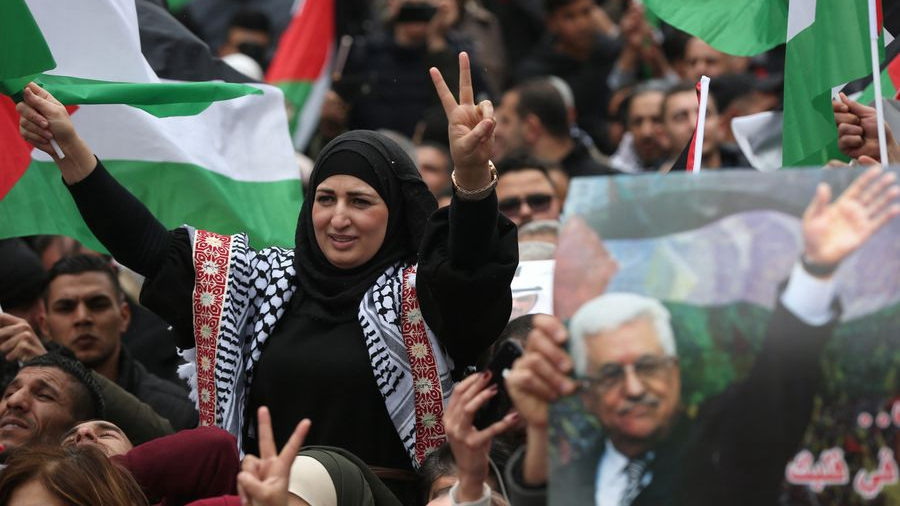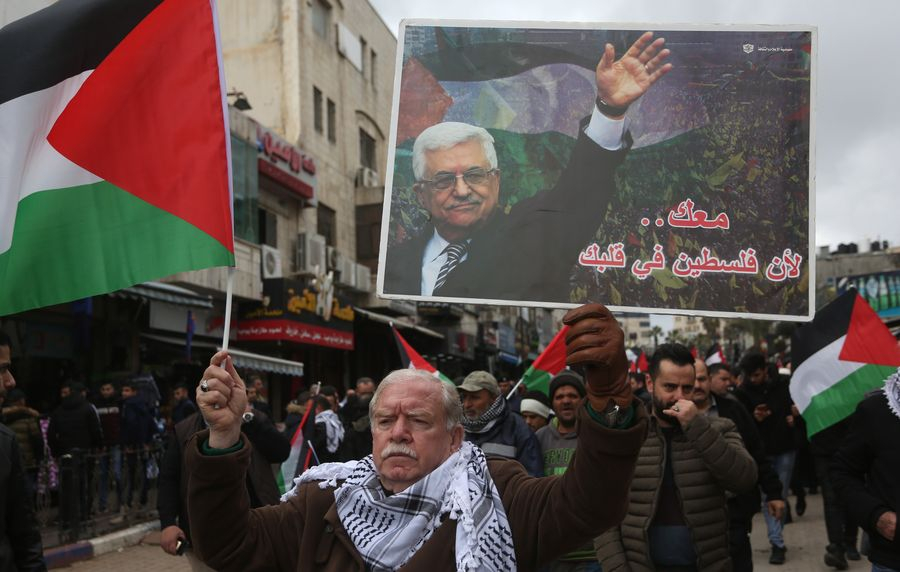
Editor's Note: Guy Burton is an adjunct professor at Vesalius College, Brussels. The article reflects the author's opinion, and not necessarily the views of CGTN.
Over the week before last, Palestinian President Mahmoud Abbas has tried to respond to the U.S. proposal to resolve the Palestinian-Israeli conflict. He has both criticized the plan while also putting forward his own path to peace. However, in both cases Abbas has faced obstacles, whether from American opposition to the proposed UN draft resolution or from the relatively static international state system. Consequently, he may be advised to seek an alternative approach, one in which Palestinian agency may have more impact.
In January, U.S. President Donald Trump launched the current diplomatic flurry when he presented his vision for resolving the Palestinian-Israeli conflict. Although he claimed to support a Palestinian state, the plan was clear that Palestinian sovereignty would be severely circumscribed. Not only would the Palestinian state would be demilitarized, Israel would control of the Jordan Valley as well as all security-related matters.
The plan has received little public support. The Arab League, the African Union and the Organization of Islamic Cooperation have all denounced it. But the U.S. has refused to back down. Tunisia planned to submit a draft resolution to the UN criticizing the plan, but was warned off doing so when the U.S. said it would damage relations between the two countries.
Last week Abbas had offered his own counter-proposal. He wants to restart the peace process through an international conference involving the Quartet (the U.S., EU, UN and Russia).
Abbas's suggestion is in line with previous Palestinian efforts to widen talks and to prevent the U.S. from monopolizing the process. The appeal to the Quartet will find support from Russia, which has also suggested a similar route. But it's not clear how committed it will be to doing so. In recent years it has prioritized relations with Israel, owing to the two being on opposite sides of the war in Syria; Russia backs the regime there and has sought to contain the impact of Israeli airstrikes and artillery bombardments against its rivals inside the country.
As for the other Quartet members, it's not clear that either the EU or the UN will take up the Palestinian call for an international conference either. The EU is currently divided over its position on the Trump plan and has yet to take a definitive position.
In addition, neither the U.S. nor Israel looks likely to accept the proposal. The U.S. reaction to Tunisia's draft resolution only shows that it is unwilling to accept any challenge to its status as the principal mediator. Similarly, Israel's leaders won't welcome widening the process: not only have they got what they wanted from Trump, but they see the UN as predisposed against it.
All this exposes the limitations of Abbas's strategy. For several decades, the Palestinian leadership has pursued internationalization. It has sought diplomatic recognition for the Palestinian state by other states and in international organizations like the UN, UNESCO and the International Criminal Court (ICC). The assumption is that if Palestine is a state then other states will be obliged to defend it against Israel.
Yet such thinking is flawed. Already 70 percent of the world's states recognize Palestinian statehood and have done little to directly challenge Israel's occupation. As for membership of international organizations, despite joining the ICC in 2015, the Court has yet to open a case against any individual for alleged war crimes perpetrated against Palestinians. In addition, a number of states have expressed their support for Israel and contested the Court's jurisdiction in this matter.
If internationalization isn't the solution to the Palestinians' plight, what is the way forward? A military solution isn't on the cards and would be extremely inadvisable. For one, there is a substantial disparity in power and resources between Israel and the Palestinians. Whether during the Second Intifada between 2000 and 2005 or in Israel's intermittent wars in Gaza in 2009, 2012 and 2014, Palestinians have been adversely affected: more of them have been killed than Israelis, and with wider physical and infrastructure damage. Additionally, resorting to violence would undermine any international support and goodwill towards the Palestinians.

A Palestinian participates in a rally in the West Bank City of Ramallah on February 11, 2020. /Xinhua Photo
A Palestinian participates in a rally in the West Bank City of Ramallah on February 11, 2020. /Xinhua Photo
Instead, an alternative strategy for the Palestinian leadership would focus on economic pressure. One way to do this might be to follow the call of the Boycott, Divestment and Sanctions (BDS) movement, which has campaigned for action against those parts of the Israeli economy and business interests which are connected to Israel's occupation of Palestinian territory, including the settlements based in the West Bank.
To that end the BDS has partnered with solidarity groups in other countries, especially North America and Europe, to pressure governments and businesses to stop support for Israel's occupation and discrimination of Palestinians and their rights.
To be clear: The BDS isn't demanding action against Israel's economy or people – a claim that those opposed to the BDS state as a way of portraying the movement as anti-Semitic.
For Abbas to embrace and focus on the BDS approach would be a substantial shift in Palestinian action. It would mean recognizing the failure of the internationalization strategy as well as accepting a grassroots initiative, which has emerged largely independent of the leadership.
Even if the BDS path is taken, the effects won't be felt quickly. Here, the example of South Africa and the end of apartheid is worth noting, not least because the BDS models itself on that experience.
Certainly, changing the wider international political and economic environment is beyond the Palestinians. However, the pursuit of boycotts, divestment and sanctions is something over which the Palestinian leadership could become more active. Not only would it expose Israel's actions in the occupied territories, but if foreign businesses and governments can be pressured to remove their support for those interests, the resulting costs may start to be felt in those parts of the Israeli economy most affected. Furthermore, given the connection between those interests and the political right, this could have an impact in governing circles, promoting them to rethink their position and willingness to accept wider international involvement.
(If you want to contribute and have specific expertise, please contact us at opinions@cgtn.com.)